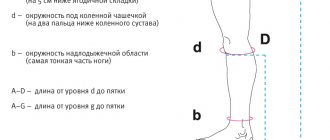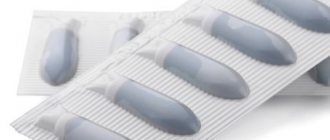Pregnancy is the most difficult period in a woman’s life, since the proper formation and development of the fetus directly depends on the health of the expectant mother.
Often, to maintain the body during pregnancy, the doctor prescribes vitamin-mineral complexes, or individual microelements necessary for the correction or prevention of certain conditions. We will talk about Panangin and its effect on a woman’s body during pregnancy in various trimesters.
Why is Panangin prescribed during pregnancy?
The drug Panangin is a synthetic complex source of potassium and magnesium, which are presented in the form of aspartates, that is, these ions easily penetrate into cells and enter into the natural metabolic reactions of the body. In this way, you can quickly and effectively replenish the reserves of these mineral salts in the body.
Consequently, the need for such therapy arises in situations where a deficiency of magnesium and potassium occurs or when the body’s need for them increases. These are, in particular, the following conditions during pregnancy:
- heart rhythm disturbance;
- coronary heart failure;
- ischemic disease during pregnancy;
- treatment with cardiac glycosides;
- hypokalemia and hypomagnesemia (that is, a lack of potassium and magnesium, in particular in the diet).
As you can see, the drug Panangin is aimed mainly at maintaining the functioning of the heart and the entire cardiovascular system. But this does not mean at all that if you were prescribed Panangin during pregnancy, then we are talking about heart pathologies, although this reason is not at all excluded.
When is it strictly prohibited to use the drug?
There are pathological conditions in which the use of Panangin is strictly prohibited:
- individual hypersensitivity to active substances and auxiliary ingredients;
- hyperkalemia;
- hypermagnesemia;
- Addison's syndrome (adrenal cortex insufficiency);
- acute or chronic renal failure;
- atrioventricular block 1-3 degrees;
- severe myasthenia gravis;
- dehydration of the body (dehydration);
- cardiogenic shock;
- acidosis.
The medicine is not recommended for patients on dialysis.
Interaction with other drugs
The likelihood of an overdose increases significantly when using Panangin together with:
- beta blockers (“Bisoprolol”, “Metoprolol”);
- potassium-sparing diuretics (“Veroshpiron”, “Aldactone”, “Spironoxan”);
- direct anticoagulants (Heparin and its derivatives);
- ACE inhibitors (Enalapril, Lisinopril);
- immunosuppressant "Cyclosporine".
The simultaneous use of several potassium- or magnesium-containing drugs, including Asparkam, Calcitriol, etc., is very dangerous. During your consultation with a doctor, you must inform about all medications you are taking.
Overdose
As a result of taking increased doses of the drug in the blood, the concentration of K and Mg ions increases. A state of hyperkalemia-hypermagnesemia occurs, which is manifested by the following symptoms:
- profuse diarrhea (diarrhea), nausea, vomiting;
- severe weakness, slow heart rate (bradycardia);
- the appearance of arrhythmias (AV block);
- drowsiness;
- diplopia (double vision);
- in severe cases – cardiac and respiratory arrest.
If such symptoms appear, you should stop using the medicine and consult a doctor.
Taking Panangin during pregnancy
Panangin in the second half of pregnancy helps to cope with swelling and cramps in the calf muscles. Although no one can guarantee you 100% success, many pregnant women still note a significant improvement in their condition and a general beneficial effect on the body.
The instructions indicate that calcium supplements interfere with the absorption of magnesium ions, and B vitamins (in particular B6), on the contrary, improve their absorption - check this issue with your doctor. Also, be sure to notify him whether you are taking any other medications during pregnancy and which ones.
To avoid the unpleasant and even dangerous consequences of some combinations between medications during pregnancy, the doctor may make some adjustments.
In general, if you feel like you are starting to choke or your heart is jumping out of your chest, then under no circumstances should you start taking Panangin without permission during pregnancy on the advice of a friend who “had this happen too.”
Only a qualified specialist (and only after a competent examination of the patient) is able to draw conclusions about whether there really is a lack of potassium and magnesium in your body, because an overdose of any of these substances is extremely dangerous for pregnant women!
Dosage of the drug
The dosage and duration of taking Panangin during pregnancy is always calculated individually, depending on the reasons for the prescription.
Rules for taking Panangin during pregnancy:
- Most often, during pregnancy, Panangin is prescribed 1-2 tablets per day.
- It is recommended to take the drug after meals, since gastric juice reduces its therapeutic effect.
- Also, you should not combine Panangin with taking other drugs containing potassium and magnesium.
Recommendations for use for pregnant women
In order for the use of Panangin during gestation to be effective and harmless, you must adhere to the following recommendations:
- Use the medicine only with a doctor's prescription.
- Periodically check the content of macroelements in the blood to prevent overdose.
- Use the tablet form of "Panangin". Unlike ampoules for parenteral administration, when administered orally (internally), the drug is absorbed more slowly, therefore reducing the risk of overdose. For intravenous infusion, the medicine is diluted in a 5% glucose solution.
- If the patient has gastrointestinal pathologies, it is preferable to use parenteral administration if there are indications for it.
- If unpleasant symptoms occur, you should stop taking it and consult your doctor.
- The tablets should be taken after meals with water. The average dose for pregnant women is 1-2 tablets. per day.
- The duration of the course is prescribed individually, depending on the specific cause of the lack of minerals.
How safe is Panangin during pregnancy?
You can be sure that potassium and magnesium are vital for the body, and the deficiency of these elements must be replenished in order to avoid the development of serious complications. The effectiveness of Panangin during pregnancy has been proven in the following conditions:
- preeclampsia, eclampsia in pregnant women;
- arrhythmias;
- leg muscle cramps.
The safety of Panangin is supported by the fact that in many forums this drug is compared with vitamins for the heart. In essence, this is true. The main thing is to remember the fact that a deficiency of elements is just as dangerous as their excess, especially during pregnancy.
Therefore, do not self-medicate under any circumstances and use Panangin strictly in accordance with the recommendations of your doctor, especially during pregnancy.
Do not forget that Panangin should be consumed after meals - this way you will minimize the risk of side effects from the gastrointestinal tract, which are considered the most common for Panangin.
I would like to note that there are no absolute contraindications to the use of Panangin during pregnancy and lactation. However, in the first 12 weeks, if possible, it should be abandoned, since there is no clinical data on its effect on the embryo.
Alternative sources of potassium and magnesium
It is not always necessary to use pharmaceuticals to correct mineral balance. You can also increase your macronutrient levels with proper nutrition. The list of foods high in potassium and magnesium is presented in the table.
| Sources of Potassium | Sources of Magnesium |
|
|
Panangin: what to replace during pregnancy?
Panangin is considered the most effective drug for pregnant women, which contains a bioavailable form of magnesium and potassium. And the presence of the shell allows cations to be delivered to the stomach without destroying them under the influence of acids.
This drug has only one analogue - Asparkam. The composition of these two products is identical, but in Panangin the minerals are in a shell, while in Asparkami they are in a simple white tablet without a film coating.
For women during pregnancy with a healthy digestive tract, which of these two drugs to take does not matter much. However, if you have a peptic ulcer or enterocolitis, it is advisable to choose Panangin.
Panangin tablets p/o No. 50 No. 1
Name
Panangin tablet p/pl.ob. in fl. No. 50 in pack. No. 1
Main active ingredient
Potassium and magnesium aspartate
Release form
Pills
Compound
Each film-coated tablet contains: active ingredients: potassium aspartate 158 mg (in the form of potassium aspartate hemihydrate 166.3 mg); magnesium aspartate 140 mg (in the form of magnesium aspartate tetrahydrate 175 mg); excipients: anhydrous colloidal silicon dioxide, potato starch, povidone K-30, magnesium stearate, talc, corn starch; film shell: macrogol 6000, titanium dioxide (E 171), main copolymer of butylated methacrylate (eudragit E), talc.
Description
White or almost white, film-coated tablets, disc-shaped, with a biconvex, slightly glossy and slightly uneven surface, almost odorless.
Pharmacological properties
Pharmacodynamics
Magnesium and potassium ions are important intracellular cations and play a key role in the functioning of numerous enzymes, in the formation of bonds between macromolecules and intracellular structures, as well as in the molecular mechanism of muscle contractility. The intra- and extracellular ratio of potassium, calcium, sodium and magnesium ions affects myocardial contractility. Endogenous aspartate acts as a conductor of ions: it has a high affinity for cells, due to the slight dissociation of its salts, ions in the form of complex compounds penetrate into the cell. Potassium aspartate and magnesium aspartate improve myocardial metabolism. Potassium/magnesium deficiency increases the risk of developing arterial hypertension, atherosclerosis of the coronary arteries, arrhythmias and metabolic changes in the myocardium.
Pharmacokinetics
Magnesium The total supply of magnesium in the body of a person weighing 70 kg is on average 24 g (1000 mmol); more than 60% of magnesium comes from bone tissue and about 40% from skeletal muscle and other tissues. About 1% of the total magnesium reserve in the body is found in the extracellular fluid, mainly in the blood serum. In healthy adults, serum magnesium levels range from 0.7 to 1.10 mmol/L. The recommended dietary intake of magnesium for men is 350 mg per day, for women - 280 mg per day. The need for magnesium increases during pregnancy and breastfeeding. Magnesium is absorbed from the gastrointestinal tract by active transport. The main regulator of magnesium balance in the body is the kidneys. 3-5% of ionized magnesium is excreted by the kidneys. An increase in urine volume (for example, during therapy with highly effective loop diuretics) leads to an increase in the excretion of ionized magnesium. If absorption of magnesium in the small intestine is reduced, subsequent hypomagnesemia leads to decreased excretion (
Indications for use
As an additional source of potassium and magnesium. As prescribed by the attending physician: - as part of complex therapy for chronic heart diseases (heart failure in the post-infarction period), rhythm disturbances, especially ventricular arrhythmias; - as an additional therapy when taking cardiac glycosides.
Contraindications
- hypersensitivity to the active substances or to any of the excipients; - acute or chronic renal failure; - Addison's disease; — atrioventricular block of the third degree; — cardiogenic shock (blood pressure less than 90 mm Hg); - children under 18 years of age.
Use during pregnancy and lactation
There is no data indicating a negative effect of Panangin® during pregnancy or breastfeeding.
Directions for use and doses
Adults Recommended daily dose: 1-2 tablets 3 times a day. The daily dose can be increased to 3 tablets 3 times a day. Directions for use: For oral administration. Panangin® should be taken after meals, as the acidic environment of the stomach may reduce the effectiveness of the drug.
Side effect
- increased frequency of stools is possible when using high doses of the drug. Reports of Suspected Adverse Drug Reactions Reports of suspected adverse drug reactions received after registration of a medicinal product are extremely important. This allows continued monitoring of the benefit/risk ratio. Health care professionals are asked to report any suspected adverse reactions using the national reporting system.
Overdose
There is no information about overdose with drugs containing potassium aspartate and magnesium aspartate, even when taking high doses. Given the ability of the kidneys to excrete large amounts of potassium, increasing the dose of the drug can lead to hyperkalemia only against the background of acute or obvious disturbances in potassium excretion. Magnesium has a wide therapeutic window, and in the absence of renal failure, serious side effects are extremely rare. According to the literature, taking oral magnesium supplements may cause mild adverse reactions such as diarrhea. High doses of Panangin® may cause increased bowel movements due to the magnesium it contains. Symptoms of hyperkalemia: general weakness, paresthesia, bradycardia, paralysis, arrhythmia. Symptoms of hypermagnesemia: nausea, vomiting, lethargic sleep, decreased blood pressure, bradycardia, weakness, hyporeflexia. Treatment: in case of overdose, stop taking the drug; Symptomatic treatment is recommended (intravenous administration of calcium chloride; if necessary, hemodialysis).
Interaction with other drugs
Drug interaction studies have not been conducted with drugs containing potassium aspartate and magnesium aspartate. According to scientific literature, potassium and magnesium may interact with certain medications. When used together with potassium-sparing diuretics, angiotensin-converting enzyme (ACE) inhibitors, beta-blockers, cyclosporine, heparin and non-steroidal anti-inflammatory drugs, the risk of developing hyperkalemia increases. Tetracyclines (orally), iron salts and sodium fluoride reduce the absorption of potassium aspartate and magnesium aspartate from the gastrointestinal tract. The break between taking the above drugs and Panangin® should be at least 3 hours.
Precautionary measures
Patients with diseases accompanied by hyperkalemia require special attention: regular monitoring of electrolyte levels in the blood serum is recommended. Use in pediatrics Panangin® is contraindicated in children and adolescents, because The safety and effectiveness of its use in this category of patients have not been established.
Storage conditions
Store at a temperature not exceeding 25 °C. Keep out of the reach of children.
Panangin during pregnancy: reviews
Pregnant women on the forums confirm that they mostly have such appointments in the 2nd and 3rd trimester. Many expectant mothers are worried and ask advice from those who were prescribed Panangin during pregnancy: should they take it or not?
The experience of other women indicates that the medicine is well tolerated during pregnancy, acts quickly and effectively: it becomes easier to breathe, the heart calms down, the mood improves and sleep improves, swelling decreases and cramps disappear.
Most of them are satisfied with the effect of Panangin tablets. But, of course, they are not suitable for everyone. Some people do not notice any effect, while others feel better if they take only magnesium separately.
All this once again confirms that different conditions require different therapy. But only a specialist can competently understand the issue.










